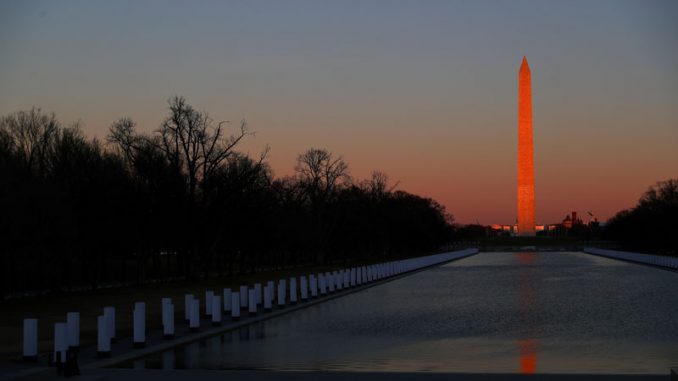
A sobering and searing moment in the lead-up to the inauguration on Jan. 20 was the display of 400 columns of light around the reflecting pool at the Lincoln Memorial. Another such moment was the new president’s request for a moment of silence to remember the 400,000 Americans who have died of COVID-19.
These moments were sobering, of course, because they brought home in rich imagery, and in a pause for prayer, the fact that so many have lost loved ones during the pandemic. There are empty chairs in living rooms and at kitchen tables, empty bedrooms, empty porch swings. Perhaps the lights and the silence also struck me powerfully because Martin Luther King Jr. Day was also the day that my parish, St. Gregory the Great, celebrated the Mass of Christian Burial with two coffins, those of a couple married 65 years who died within 20 hours of each other — due to COVID. I have been to more funerals over the years than I would ever want to count, but this one was unlike any other. We believe in our heavenly destiny and the resurrection of the body, but we have so much to mourn.
The moments of grief highlighted amidst the funeral on Jan. 18 (while we also were honoring an assassinated champion of justice), the vigil at the Mall on Jan. 19, and the inaugural pause on Jan. 20, were searing in themselves. But they were also searing because of another realization which was brought home as we remembered our dead. If we were to have memorialized those who have died by abortion since Roe v. Wade was decided on Jan. 22, 1973, we would have to display 61,000 columns of light.
It would be in the same proportion as the 400 representing 400,000 dead Americans: 61,000 lights to represent 61,000,000 unborn American children. Amanda Gorman declared at the end of her inaugural poem: “The new dawn blooms as we free it./For there is always light,/if only we are brave enough to see it,/if only we are brave enough to be it.” Whatever the poet’s persuasions might be, those of us who stand as resoundingly pro-life Catholics can read these lines from our perspective and apply them to the light we see. It is the light of Christ, the light of the sanctuary lamp telling of Christ’s Eucharistic presence, and the light of the world, which our Lord proclaimed not only that He is (in John’s Gospel) but also that we are (in Matthew’s Gospel).
That having been said, the other searing realization that came to me as I grappled with the realization of 400,000 dead in a year of pandemic and 61,000,000 dead in an era of “choice” is that we will never know how many of the aborted would have borne light — and particularly Christ-light — that has been not only dimmed but deadened by a court decision that deemed unborn children a woman’s property.
We will never know who might have been another generation’s saints, scientific geniuses, selfless caregivers, effective teachers, stunning artists and musicians and poets; or some lesser known but impactful people like the cheerful young man at Target who cashes us out as he relies on a wheelchair and crutches; or Ricky, who mops the floor at Circle K and regrets that he cannot, right now, deliver the usual hug; or the talented hair stylist Alexis, who has worked her way from Great Clips to now owning her own business.
Four of our presidents went to the Tomb of the Unknown Soldier at Arlington on Jan. 20. Grief for our losses from war, along with disease and other causes is altogether fitting. But somehow we fail to mention that we have lost, because of abortion, more than 10 times as many unknown Americans as persons killed in concentration camps in World War II. And many, many of our unknowns were members of racial and ethnic minorities who have been counseled that their bearing children is burdensome. We have no national tombs or presidential ceremonies dedicated to our nation’s discarded humans.
In his homily at the Pastoral Center on Jan. 22, Bishop Guglielmone recounted the story of a priest who was asked where in the Bible it says not to abort. The priest responded that the word abortion isn’t used, but that one example acknowledging the humanity of the unborn is the leaping of John the Baptist in the womb when Elizabeth’s pregnant cousin Mary came to visit.
There are other passages we might cite, like God’s declaration to the prophet Jeremiah, “Before I formed you in the womb I knew you, before you were born I dedicated you” (Jer 1:5).
As I’ve ruminated over the events of the week of Jan. 18-22, I am haunted by a poem and, layered along with it, words from Deuteronomy 30:19-20, which stand as admonition and demand: “I have set before you life and death, the blessing and the curse. Choose life, then, that you and your descendants may live, by loving the Lord, your God, obeying his voice, and holding fast to him. For that will mean life for you . . .”
Let’s rewrite a lauded poem in light of heartbeats. And let’s determine to pray and work for the changes of heart needed for us to see bravely every place — from womb to last breaths, in refugee camps and on death row, on back roads and boulevards — that humanity truly lives. The God of Life is the light, if only we can see it. And we are God’s living and let-living light, if only we can be it.

